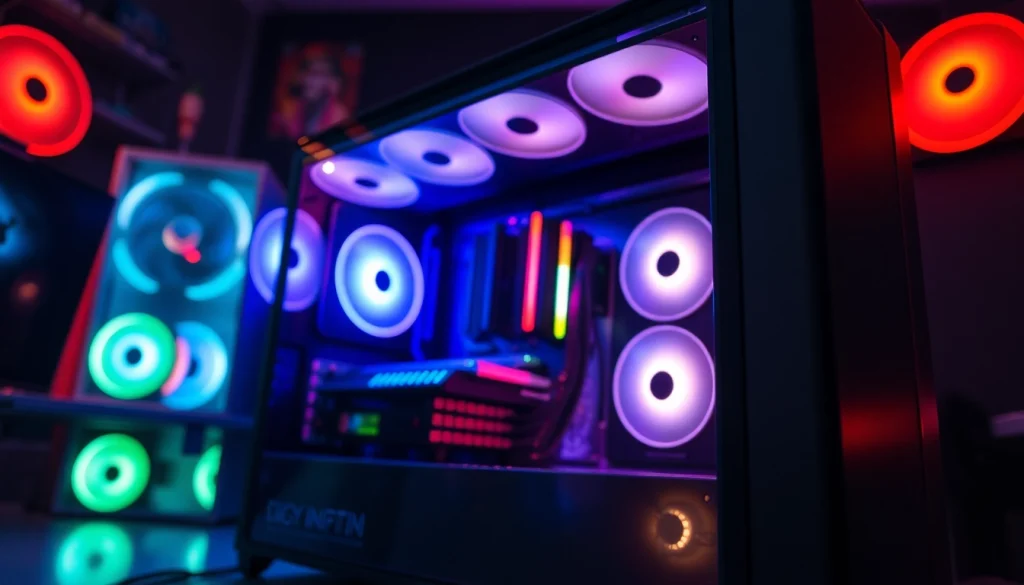Understanding PC CASE Varieties
Types of PC Cases Available
When embarking on the journey of building or upgrading a PC, one of the foundational elements you must consider is the PC CASE Supplier you choose, along with the type of case that fits your needs. The landscape of computer cases is diverse, catering to a variety of preferences and requirements. Here, we will delve into the most commonly found types of PC cases, each designed for specific setups and user preferences.
- Mid-Tower Cases: Perhaps the most popular choice for gaming and general-purpose PCs, mid-tower cases offer a balance between size and expandability. They provide ample room for several drives, graphics cards, and cooling solutions. Ideal for most builds, they strike a perfect balance for those who require performance without excess.
- Full-Tower Cases: For enthusiasts or those looking to build high-performance systems, full-tower cases provide the most space for numerous components. These cases can accommodate a substantial number of drives, extensive cooling systems, and large GPUs, making them a favored option for custom high-end builds.
- Mini-Tower Cases: As the name suggests, mini-tower cases are compact and suitable for small builds or limited desk space. While they may limit the number of components, they are often designed adeptly for airflow and cooling, appealing to users who prioritize space savings.
- Micro-ATX and Mini-ITX Cases: These cases are designed specifically for Micro-ATX and Mini-ITX motherboards. They are popular choices for home theater PCs (HTPCs) or compact desktop setups where space is at a premium. Though smaller, they often feature innovative designs to maximize airflow and usability.
- Open-Air Cases: For those who seek maximum cooling and accessibility, open-air cases allow for efficient heat dissipation and easy component access. However, they do expose components to dust and environmental factors, making them a niche choice for experienced builders.
- All-in-One Cases: These come pre-loaded with essential components like cooling systems and power supplies, aimed at users who prefer an all-in-one solution without the need for complex assembly. They are particularly advantageous for those who prioritize ease of setup over customization.
Choosing the Right Size for Your Setup
Selecting the correct size for your PC case is crucial. The choice affects not only aesthetics but also functionality and performance. Factors such as mobility, component compatibility, cooling options, and personal preferences should guide your decision.
Understanding your primary use case is vital. For gamers, larger cases allow for enhanced cooling and airflow, while professionals who may need a portable workstation may benefit from a smaller, lighter case. Be sure to also check motherboard dimensions, GPU lengths, and CPU cooler heights as these will impact the selection significantly.
Understanding Materials and Durability
Materials used in PC cases can greatly influence durability, weight, and aesthetics. Most cases are constructed with steel or aluminum, but many incorporate plastics or tempered glass for visual appeal.
- Steel: Known for its strength and durability, steel cases are robust and can support heavy components well. However, they may not offer the best ventilation if not designed with airflow features.
- Aluminum: Lighter than steel and often premium in appearance, aluminum cases are favored among enthusiast builders. They provide good thermal conductivity, enhancing cooling potential.
- Plastic: Often used for cheaper models, plastic can reduce costs but may compromise durability and insulation. It is best for non-performance setups or budget builds.
- Tempered Glass: Common in modern builds for aesthetic purposes, tempered glass allows users to showcase their components. While visually impressive, it can be more fragile than metals and needs careful handling.
Why Selecting the Right PC CASE Supplier Matters
Quality Assurance from Trusted Suppliers
All PC case suppliers are not created equal. The relationship between you and the supplier can sway the overall success of your build. Quality assurance is essential as a reliable supplier ensures that their cases meet industry standards and are subjected to adequate testing.
Choosing a reputable PC CASE Supplier often guarantees a level of quality assurance, which is crucial to your PC’s longevity and performance. Suppliers commonly assert their quality through warranties and return policies, demonstrating trust in their products and understanding of customer satisfaction.
Warranty and Customer Support
A significant advantage of using a trusted PC case supplier is the level of support they provide. A solid warranty can protect your investment in the long run, providing peace of mind as you assemble your PC. Look for suppliers that offer warranties lasting at least one year, ideally longer.
In addition to warranties, consider the customer support availability. A responsive support team can make a difference when you face compatibility issues or need product guidance. Reading reviews and experiences can help discern the reliability of customer service.
Comparing Pricing Structures
Price comparisons among PC case suppliers can reveal significant differences influenced by factors such as brand reputation, materials used, and the included features. Don’t always default to the cheaper option, as customers might find that spending a little more yields better build quality, aesthetic appeal, and functionality.
Take into account not only the retail price but also shipping costs, potential duties, and any warranty implications. Sometimes the cheapest initial price does not translate to the best value long-term.
Key Features to Look for in a PC CASE
Cooling Solutions and Airflow Design
Effective cooling is essential for a well-functioning PC. When inspecting potential cases, consider features that enhance airflow and cooling efficiency. Look for cases that support multiple cooling fans, strategically placed airflow channels, and options for liquid cooling systems.
Airflow design can differ significantly between models, with some featuring mesh panels that facilitate unrestricted airflow, while others may create restrictions leading to potential heating problems.
Expansion Potential and Customization Options
One of the joys of PC building is the ability to customize and expand your system. Ensure that the case you select offers flexibility regarding future upgrades. Look for cases that can accommodate additional storage drives, extra fans, and larger graphics cards.
Cases with modular designs can allow you to install new components with ease, which is vital if you plan on gaming or require high processing power for tasks like video editing.
Style, Aesthetics, and Color Options
While functionality is critical, aesthetics equally play a role in many builders’ decisions. PC cases come in various styles and colors, appealing to a broad spectrum of tastes. Choose a design that resonates with your personal aesthetic, whether it’s sleek and professional or vibrant and gamer-oriented.
Many modern cases incorporate RGB lighting, tempered glass panels, and customizable accents, allowing enthusiasts to showcase their builds and preferences effectively.
The Importance of Brand Reputation in PC CASE Suppliers
Top Players in the Market
Brand reputation significantly influences consumer decisions when purchasing a PC case. Companies like Corsair, Thermaltake, and Lian Li have established themselves as industry leaders thanks to their commitment to quality, innovative designs, and customer service.
Familiarize yourself with brand histories. Brands that have a consistent reputation for delivering excellent products often have loyal customer bases and abundant resources for after-purchase support.
Customer Reviews and Feedback
Before finalizing your purchasing decisions, dive deep into customer reviews and feedback. Pay close attention to common praises or issues reported by users related to the product. Notably, factors like ease of assembly, thermal performance, and material quality often lead to discussions among fellow builders.
Sources like tech forums and retail websites can offer unfiltered insights into customer experiences. Engaging in communities and combing through discussions can give you a clearer picture of what to expect.
Online Presence and Community Engagement
In today’s digital age, a company’s online presence and community engagement often reflect its commitment to customers. Brands that actively participate in technical forums, social media platforms, and multi-user environments often offer valuable resources, troubleshooting tips, and community connection.
A brand’s ability to address customer queries and provide support over social media or community platforms can also convey their dedication toward consumers.
Steps to Take When Choosing a PC CASE Supplier
Researching Your Options
The primary step in selecting a PC case supplier is thorough research. Leverage multiple resources, including online reviews, comparison websites, and community forums to gather insights. Familiarizing yourself with a variety of suppliers will provide insights into product offerings, pricing, and customer service.
Consider compiling a shortlist of potential suppliers for in-depth analysis to ensure you’re making an informed choice.
Assessing Compatibility with Other Components
Ensuring that your selected PC case is compatible with your other components is critical. This includes the motherboard size, GPU length, and cooling systems. Refer to product specifications and community resources to confirm that your desired build will fit and function seamlessly inside the selected case.
Using build guides or PCPartPicker can help visualize compatibility issues before making a purchase. Ensuring all components fit will ultimately lead to a hassle-free building experience.
Making the Purchase: Tips and Tricks
Once you’ve conducted thorough research and found the right supplier and PC case, it’s time to finalize your purchase. Check for any promotional codes, bundle deals, or seasonal sales that could provide financial savings. Be patient and consider waiting for sales events like Black Friday or product release anniversaries to secure the best deals.
Moreover, keep an eye on return policies or restocking fees as you make your final decision, ensuring you have protection if your chosen case does not meet expectations upon arrival.





